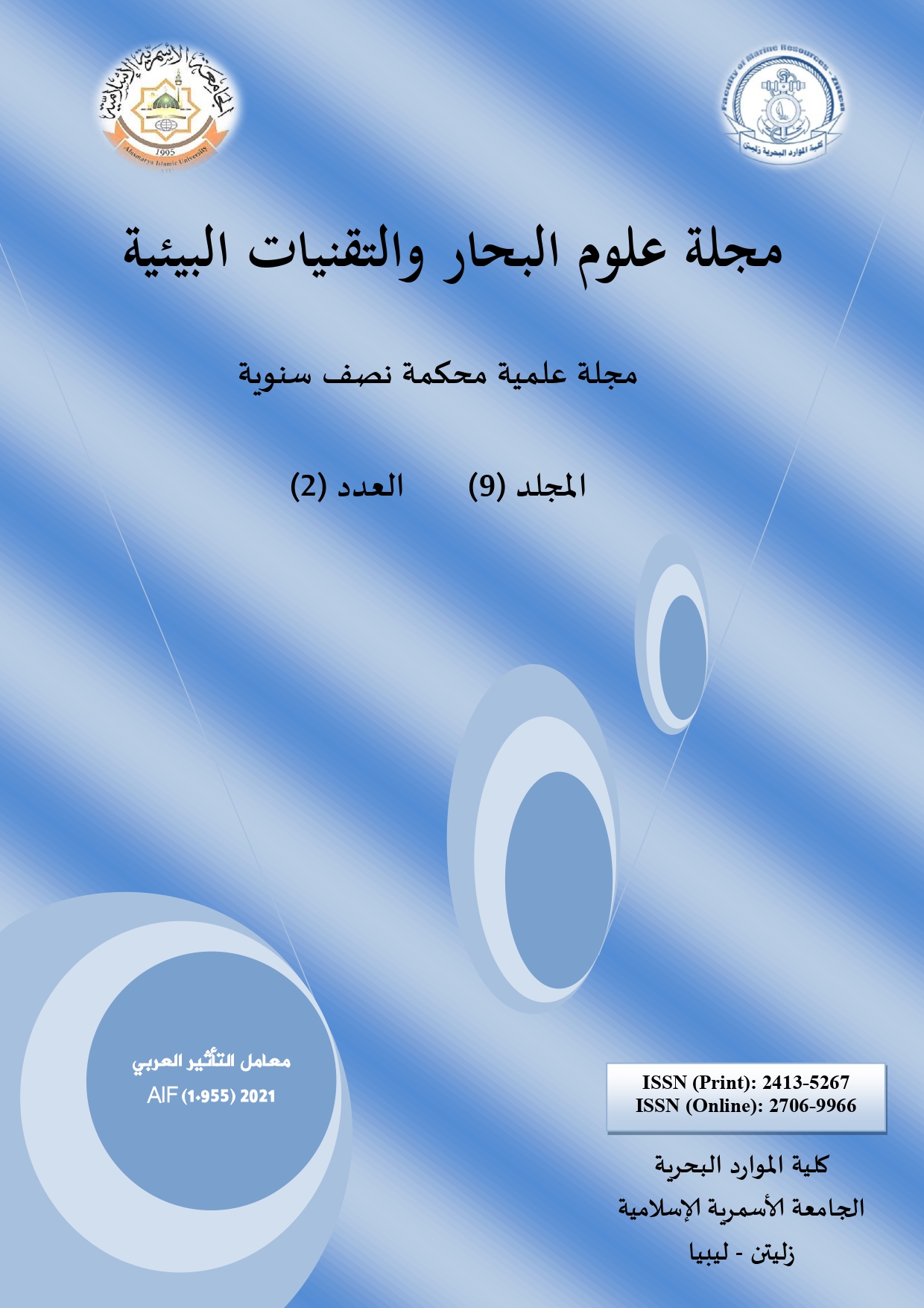تطبيق النمذجة لتقييم الاعتمادية البشرية وطريقة تحليل الخطأ في الأنظمة البحرية
DOI:
https://doi.org/10.59743/jmset.v9i2.167الكلمات المفتاحية:
الخطأ البشري، العوامل البشرية، تقييم اعتمادية الأداء البشريالملخص
الهدف الرئيس من هذه الورقة هو تقليل الأخطاء البشرية في بيئة مكان العمل، خاصة أثناء العمليات الحرجة على متن السفن باستخدام نظام تقييم الاعتمادية البشرية(HRA) . تتطلب العمليات الحرجة على متن السفن وعيًا تامًا بالمخاطر التشغيلية من قبل الطاقم، حيث إن الخطأ البشري يمثل مشكلة كبيرة، وهو سبب رئيس للحوادث البحرية بنسبة من 75 إلى 96 ٪ من حوادث السفن، حيث يقوم الطاقم البحري بواجباته على متن السفن في ظروف وأوقات مختلفة ضمن عوامل مختلفة مثل؛ النمو السريع للتكنولوجيا وبيئة العمل والجوانب الاجتماعية، والتي قد تؤدي أو تساهم بشكل كبير في الفشل البشري المحتمل. إن إدراك الإجراءات والأفعال التي تحتاج إلى مهارة من قبل العنصر البشري أمر ضروري؛ لذلك. فإن دور طاقم السفينة بمرور الوقت يحتاج ليس فقط إلى القدرة على اتخاذ القرارات المناسبة وإنما القدرة على حل المشكلات أيضا. اعتمدت الدراسة على المنهج الوصفي وناقشت العوامل البشرية المؤثرة على العنصر البشري المسبب للحوادث البحرية وكيفية الحد من الحوادث البحرية باستخدام نظام تقييم اعتمادية الأداء البشري (HRA).
التنزيلات
المراجع
Aalipour, M., Ayele, Y. Z., & Barabadi, A. (2016). Human reliability assessment (HRA) in maintenance of production process: a case study. International Journal of System Assurance Engineering and Management, 7, 229-238. DOI: https://doi.org/10.1007/s13198-016-0453-z
Ahmad, A. (2016). Human Reliability Analysis (HRA). Lecture Presentation, UTM, Malaysia. Available at: [https://arshadahmad.files.wordpress.com/2016/09/raam-p8-3human-reliability-analysis.-pdf].
Akyuz, E., & Celik, M. (2015). A methodological extension to human reliability analysis for cargo tank cleaning operation on board chemical tanker ships. Safety Science, 75, 146155. DOI: https://doi.org/10.1016/j.ssci.2015.02.008
Akyuz, E., Celik, M., Akgun, I., & Cicek, K. (2018). Prediction of human error probabilities in a critical marine engineering operation on-board chemical tanker ship: The case of ship bunkering. Safety science, 110, 102-109. DOI: https://doi.org/10.1016/j.ssci.2018.08.002
Allianz Global Corporate & Specialty. (2018). An annual review of trends and developments in shipping losses and safety. Safety and Shipping Review 2018. Available at: [https://www.agcs.allianz-.com/assets/PDFs/Reports/AGCS_Safety_Shipping_Review_2017.pdf].
Arnhus, M. (2014). Modeling of Technical, Human and Organizational Factors and Barriers in Marine Systems Failure Risk: Modeling of Stability Operations on a Semi-Submersible Unit with the use of Bayesian Belief Networks. Master's thesis, Institutt for marin teknikk, Norway.
ATD (2008). Atomic Energy Regulatory Board Technical Document (AERB TD). Available at: [https://www.aerb.gov.in/storage/uploads/documents/regdocpnOoF.pdf]. India: AERB. Atomic Energy Regulatory Board.
Barnett, M. L. (2005). Searching for the root causes of maritime casualties: —Individual competence or organisational culture?. WMU Journal of Maritime affairs, 4, 131-145. DOI: https://doi.org/10.1007/BF03195070
Batalden, B. M., & Sydnes, A. K. (2014). Maritime safety and the ISM code: a study of investigated casualties and incidents. WMU Journal of Maritime Affairs, 13, 3-25. DOI: https://doi.org/10.1007/s13437-013-0051-8
Baziuk, P. A., Rivera, S. S., & Nuñez McLeod, J. (2014). Towards human factor taxonomy with cognitive generic terms. Proceedings of the World Congress on Engineering.
Berg, H. P. (2013). Human factors and safety culture in maritime safety. Marine Navigation and Safety of Sea Transportation: STCW, Maritime Education and Training (MET), Human Resources and Crew Manning, Maritime Policy, Logistics and Economic Matters, 107, 107-115. DOI: https://doi.org/10.1201/b14959-20
Ceyhun, G. C. (2014). The impact of shipping accidents on marine environment: A study of Turkish seas. European Scientific Journal, 10(23), 10-23.
De Felice, F., Petrillo, A., Carlomusto, A., & Romano, U. (2013). Modelling application for cognitive reliability and error analysis method. Int J Eng Technol, 5(5), 4450-4464.
EMSA (2020). European Maritime Safety Agency. Available at: [http://www.emsa.europa.eu/damage-stability-study/items.html?cid=77:publications-&id=3734].
Fowler, E. (2018). Critical evaluation of quantitative human error estimation methods in light of different incident causation models and Hollnagel’s research on performance variability. M.Sc. dissertation, University of Aberdeen.
Havlikovaa, M., Jirgl, M., & Bradac, Z. (2015). Human reliability in man-machine systems. Procedia Engineering, 100, 1207-1214. DOI: https://doi.org/10.1016/j.proeng.2015.01.485
Hogenboom, I. (2018). Comparison of Human Reliability Analysis Method Applied on the Volkerak sluice complex in the Netherlands. Master Thesis, Aalborg University Esbjerg.
Hollnagel, E. (1998). Cognitive reliability and error analysis method (CREAM). Elsevier.
ICS (2019). safety4sea. Available at: [https://safety4sea.com/cm-al-salam-boccaccio-98-bad-weather-poor-emergency-procedures-and-over-1000-people-dead-in-red-sea.:Editorial Team].
Kennedy, G. (2006). Human Reliability Assessment. Course lecture. Available at: [https://www.coursehero.com/file/20936455/HRA12].
Maritime, H. E. A. (2014). Human Error and Maritime Safety. M.Sc. dissertation. Ministry of Shipping and Island Policy, Directorate of Marine Education, Department A of Regulations and Educational Programs, Asynchronous Distance Education Service Technical Committee,
Martinez de Oses, X., & Ventikos, N. P. (2003). A critical assessment of human element regarding maritime safety: Issues of planning, policy and practice. Revista del Instituto de la Navegación de España, 17(17), 68-80.
Parvez, M. (2010). Greenwich Maritime Institute. Available at: [https://www.he-alert.org/filemanager/root/site_assets/standalone-_article_pdfs_0905-/HE01005.pdf].
Rashed, S. K. (2016). Human reliability assessment, the sophisticated tools for minimizing human errors in maritime domains. International Journal of Research in Engineering & Technology, 4(2), 85-98.
Rothblum, A. M., Wheal, D., Withington, S., Shappell, S. A., Wiegmann, D. A., Boehm, W., & Chaderjian, M. (2002). Human factors in incident investigation and analysis. Report of Working Group. In: 2nd International Workshop on Human Factors in Offshore Operations, Texas, 142p.
Thomson, R. J. (2002). Technical Report. Avai;able at: [https://www.healert.org/filemanager/root/-site_assets/standalone_article_pdfs_0605-/he00715.pdf]. Australian Maritime Safety Authority.
التنزيلات
منشور
إصدار
القسم
الرخصة
الحقوق الفكرية (c) 2023 مجلة علوم البحار والتقنيات البيئية

هذا العمل مرخص بموجب Creative Commons Attribution 4.0 International License.












